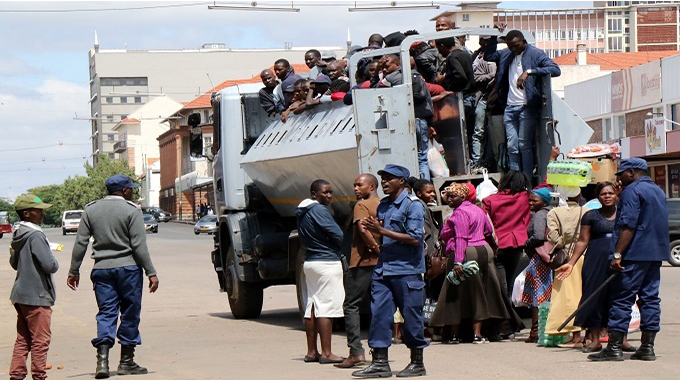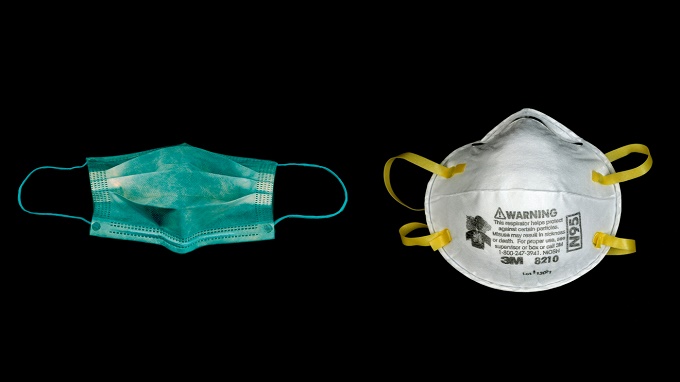Covid-19: Dilemma of living on streets

Patrick Chitumba, Midlands Bureau Chief
Maxwell Chinaka faces a dilemma. He is not sure whether to get into town and scavenge for used bottles of hand sanitiser from the dust bins dotted around the Gweru Central Business District or just remain at their temporary shelter near Gweru River.
At the temporary shelter are four boys aged between 11 and 15 years. Before the 21-day lockdown, a strategy that is being implemented by the Government and others throughout the world to contain the spread of Covid-19, the boys used to sleep in alleyways at Third and Fourth streets.
But that changed last Sunday when they were ordered off the alleys to go back to their homes.
“I don’t have anywhere to call home. I came to the streets of Gweru from Gokwe two years ago following the passing of my mother. I never knew my father. I was thrown out of home and made my great trek to Gweru where I met Joe, Ngoni and Peter. We’ve been staying together surviving on the little we get from well-wishers and scavenging for food from the bins dotted around the CBD. When we were told to vacate, we had no option but to come here,” said 14-year-old Maxwell.
Maxwell said they hear about Covid-19 but are not sure what to do to protect themselves.
“We have no masks or hand sanitisers. We hear about the need to be clean and hygienic, but how does one living near Gweru River which is flowing with sewage keep his hygiene? Can I walk into town and scavenge for hand sanitiser from the bins? There are no people in the streets and I’m sure I’ll find none.
We’re in a dilemma because we want to be clean, we want to protect ourselves too but we can’t do it from here. We don’t have a place to call home and when they said we must go home, we had nowhere to turn to,” he said.
Covid-19 poses a new threat to those who have poor access to food, shelter, and basic hygiene.
Living without a stable home is bad for one’s health. Lack of health care coupled with malnutrition and bad hygiene puts homeless people at risk of contracting contagious and chronic illnesses.
The rates of respiratory diseases, which are a major risk factor for Covid-19 patients, are particularly high among this population.
As the coronavirus spreads rapidly, the Government has called on people to remain at home.
Today marks a week after the Government began enforcing a three-week lockdown in its fight against Covid-19 after the disease infected nine people, killing 30-year-old broadcaster, Zororo Makamba.
President Mnangagwa declared the lockdown from Monday last week, curtailing movement, shutting most shops and suspending flights in and out of the country.
“This 21-day lockdown is not a punishment. It’s an opportunity to save lives by acting responsibly. This was not an easy decision to make but it was the right decision. Nothing is more sacrosanct than the lives of the people of Zimbabwe,” said President Mnangagwa.
The World Health Organisation (WHO) officially declared Covid-19 a global pandemic on March 11 and the Centres for Disease Control and Prevention (CDC) project that the virus’ spread will get worse before it gets better.
During this unsure and rapidly changing public health landscape, individuals and families experiencing homelessness are especially vulnerable due to lack of access to medical resources, stable shelter, and reliable and rapid communication.
At times of crisis and disaster, homeless individuals like Maxwell and families are even more at risk. Housing insecurity looks different across experiences, and each person and family has specific needs to ensure their health and safety during this global crisis.
In Gweru, police have been mounting checkpoints on routes leading to the CBD, stopping cars and turning away pedestrians who have no authorisation to be in the area.
Only those working in essential services, including doctors, nurses, supermarket workers and fuel station attendants, are allowed to move around.
There has also been high demand for lemons and the malaria drug chloroquine as locals scramble for popular and unproven treatments for the Covid-19.
In Mkoba, Senga, Mambo and Athlone, there is a high demand for lemons with unverified claims the fruit can fight Covid-19.
Pharmacies on the other hand have been maximising on the surge in demand of chloroquine which is now pegged at US$10 per 100 tablets.
Maxwell, other homeless people and those in charity homes such as Queen of Peace in Gweru cannot afford such “luxuries.”
Many deal with multiple diseases, malnourishment from food insecurity, mental health problems and violence.
No one seems to have thought of them in light of the virus.
The homeless of Gweru would sleep along shop pavements but since the lockdown was declared, they have not been seen at their usual spots. They seem to have disappeared into thin air.
The bins they normally scrounge for food from are empty as the Gweru City Council refuse collection team did rounds collecting litter last week Monday meaning there is nothing if they were to go back.
At the same time, there is no one to beg from as the CBD is empty.
From last week Monday, Gweru’s normally-bustling CBD has been virtually deserted, posing a challenge for street kids who survive on handouts from the well-wishers.
The homeless have to keep working, regardless of how heavily affected the country is by the pandemic.
Most come from poor families and survive on scavenging and handouts from well-wishers.
As people with homes talk of hand sanitisers and disinfectants, the disadvantaged people have not been catered for.
“We have little influence over the homeless people, those who are mentally challenged and the street kids/ adults as society wants to refer to them as such. As Queen of Peace, we cater for the children we have and it’s not enough. We also need the sanitisers, we need the gloves and masks. We try by all means to teach them theory and practical on Covid-19,” said Mrs Thembi Kupemba of Gweru based charity organisation, Queen of Peace Rehabilitation Centre.
Policymakers should also support direct street outreach and care. Barriers to access to traditional medical care suggests street- and shelter-based care is more efficient for people facing homelessness.
In the United States of America, experts suggest adopting community-centric health care models within shelters to reduce the burden and cost faced by hospitals as a result of the pandemic.
States and localities should develop specific, actionable plans for outreach to homeless people—who are already at higher risk for infectious disease and have higher rates of chronic illness—to make sure that their health care needs are met during this time.
If Covid-19 becomes present in encampments and unsheltered group living spaces, rapid education about how to prevent the spread and the distribution of soaps, sanitisers, and other preventative materials should be made readily available. Public Service, Labour and Social Welfare Minister Professor Paul Mavima said the Government was alive to the needs of the homeless in the face of Covid-19.
As such, he said they had started identifying centres to house homeless people across the country starting with Harare.
“In Harare, we have established three centres where we’re housing these homeless people so that they have somewhere to call home. We have identified a training institute for the Ministry of Youth in Mount Hampden where we have moved those who are in families.
At Ruwa Rehabilitation Centre we have taken in boys who are below 18. At Jamaica Inn along Mutare Road, we have taken in women above 18 and we are also going to put in girls. So, we have about 42 going to the boys’ facility, 45 coming in as families and six women at Jamaica Inn,” he said.
Prof Mavima said he had tasked the department of social welfare to look for facilities across the country to house homeless people.
He said blankets, clothing and mattresses for the shelter homes are there and more are expected.
“We’re taking the homeless people from the street in the fight against Covid-19.We’re using funds from our current budget and I know we’ll get something from treasury soon since this is a national disaster. Homeless people in Bulawayo, Gweru, Mutare and across the country should be put in shelters where they can be monitored,” he said.
Government has set aside over $600 million to cover one million vulnerable households under a cash transfer programme for the next three months to mitigate the impact of Covid-19.
The Social Welfare Department will use its structures to identify the beneficiaries under the facility.
Treasury has already provided $500 million to fight Covid-19 and is ready to attend to more requests.
Critically, Government has provided a further $50 million to Premier Service Medical Aid Society (PSMAS) to prepare for Covid-19 and to cater for the health requirements of civil servants who are the majority of the Society’s members.











Comments